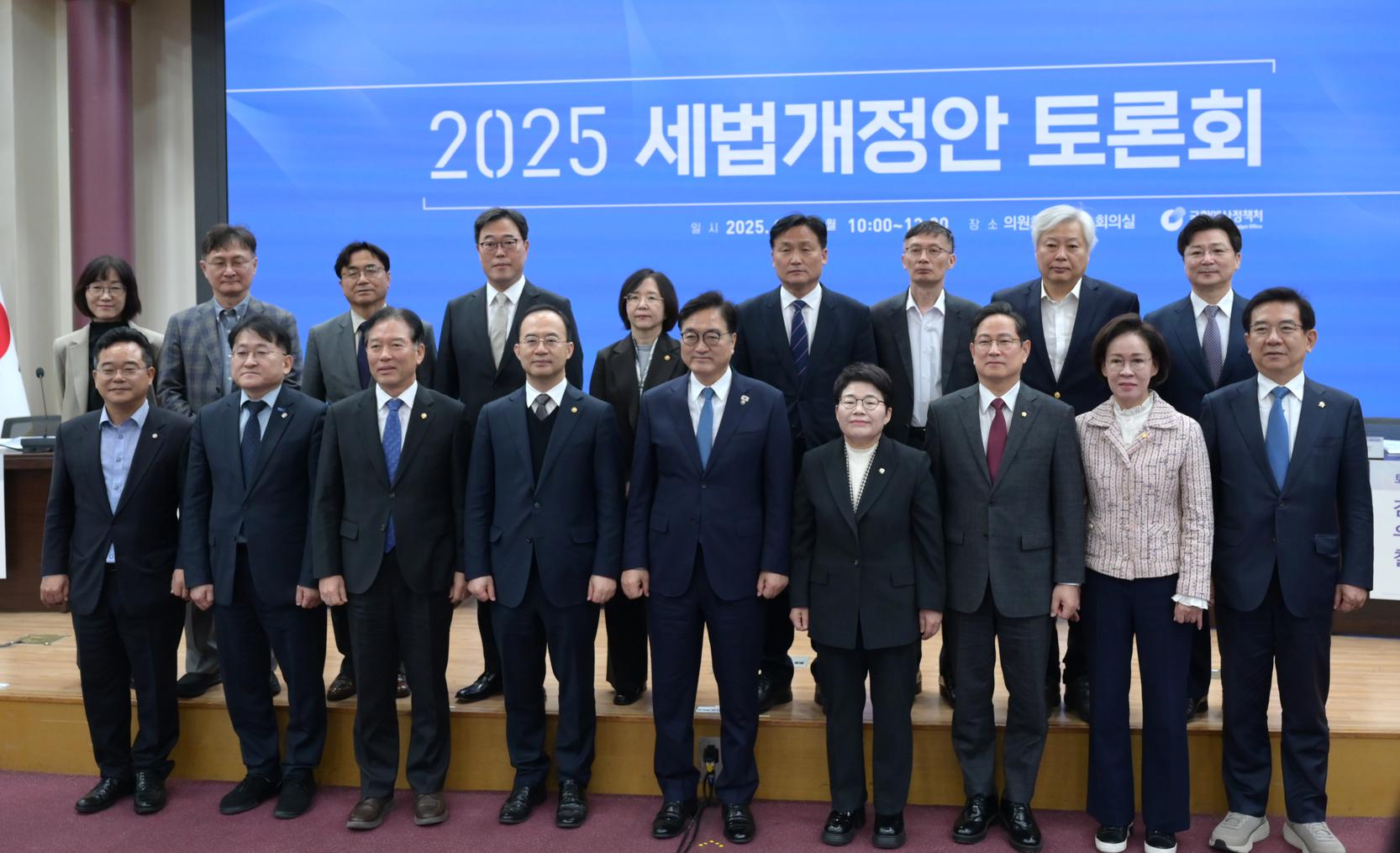| Title | NABO Holds the Grand Debate on the 2025 Tax Reform Proposals | ||
|---|---|---|---|
| Views | 50 | Date | 2025-11-12 |
|
The National Assembly Budget Office held the Grand Debate on the 2025 Tax Reform Proposals on Monday, November 10, at 10:00 AM in the first conference room of the National Assembly Members' Building to discuss major issues and improvement tasks related to the tax reform proposals. In his opening remarks, NABO Chief Chi Dong-ha stated, "This government's tax reform proposal is the first revenue-increasing reform pursued in eight years since 2017, and it is expected to expand the revenue base centered on corporate tax and securities transaction tax, while strengthening tax support for industrial development including national strategic technologies." National Assembly Speaker Woo Won-shik emphasized the importance of tax policy as an issue that all citizens can relate to, and conveyed words of encouragement, saying, "I hope the National Assembly will consider various perspectives and produce balanced results, as taxation goes beyond raising revenue to serve as a mechanism for promoting industrial development and protecting the socially vulnerable." Chairperson Lee-ja Lim of the National Assembly Strategy and Finance Committee stated in her congratulatory remarks, "I expect that today's debate will share diverse opinions on major issues in the government's '2025 Tax Reform Plan,' including the increase in corporate tax rates and education tax rates, and the introduction of separate taxation on dividend income for high-dividend companies. I will do my best to ensure thorough review of the tax reform proposals in the Strategy and Finance Committee." The debate was moderated by Professor Park Ki-baeg of the Tax Accounting Department at the University of Seoul. Park Geum-cheol, Director of the Tax Policy Bureau at the Ministry of Economy and Finance, who presented the first topic, outlined the basic direction of the government's 2025 tax reform plan as tax support for economic development, livelihood stability for ordinary people and the middle class, and expansion of the revenue base to support the role of fiscal policy, while explaining the implementation progress and expected effects of measures such as expanded support for future strategic industries including AI, the introduction of separate taxation on dividend income for high-dividend companies, and the restoration of corporate tax rates. Sang Ji-won, Director General of the Estimates and Tax Analysis Division at NABO, who presented the second topic, evaluated this year's government tax reform proposal as a revenue-increasing tax reform that strengthens policy support for nurturing strategic industries and revitalizing capital markets, as well as the revenue generation function, and suggested that efforts to expand the revenue base should continue, but fiscal management is needed to use those resources to expand the foundation for future growth. Following the presentations, discussions ensued. Jung Tae-ho (Democratic Party), vice chairman of the Strategy and Finance Committee, who took the floor as the first discussant, evaluated that this tax reform proposal restored the role of sustainable fiscal policy in that it normalized the previous government's corporate tax reduction measures, managed tax expenditures within legal limits, and secured financial resources for education and balanced regional development by raising the education tax rate for financial and insurance companies with profits exceeding 1 trillion won. Park Soo-young (People Power Party), vice chairman of the Strategy and Finance Committee, pointed out that efforts to reduce spending are needed rather than increasing revenue through tax rate hikes to achieve fiscal balance, and that this year's tax reform proposal deviates from the principle of taxation: 'low rates, broad base.' He also argued that while property holding tax increases should be approached cautiously, transaction tax reductions are necessary, and reforms such as education tax reductions and abolition of inheritance tax between spouses should be pursued. Cha Gyu-geun, member of the Rebuilding Korea Party and the Strategy and Finance Committee, viewed this tax reform proposal as significant in terms of revenue expansion. However, he argued that in detail, realistic measures need to be considered, such as providing benefits for differential dividends centered on small shareholders in the case of separate taxation on dividend income, and that discussions on the overall financial taxation system, including capital gains tax on stocks, should be resumed while seeking ways to improve the effective corporate tax rate. Chun Ha-ram, member of the Reform Party and the Strategy and Finance Committee, pointed out that the corporate tax rate increase is undesirable for the international competitiveness of Korean companies, and that global trends need to be comprehensively considered. He also argued that in the case of separate taxation on dividend income, artificial dividend promotion may cause distortions in the stock market and corporate management, and that proactive tax policies are necessary for balanced regional development. Professor Jeong Se-eun of the Economics Department at Chungnam National University evaluated that while this tax reform proposal is meaningful in that it halted the previous government's tax reduction policies, the revenue base has not yet sufficiently recovered. She also emphasized that expectations regarding the effects of easing dividend income taxation are somewhat exaggerated, and that there is a need to comprehensively redesign the asset tax system with awareness of deepening asset inequality. Professor Kim Woo-cheol of the Tax Accounting Department at the University of Seoul, the final discussant, believed that even if revenue expansion is necessary, careful consideration is needed in choosing the timing of tax increases given economic recovery. He also evaluated that increases and frequent adjustments to corporate tax rates are undesirable in terms of the business environment and investment revitalization, and that the unannounced education tax increase appears to lack policy consistency. 
|
|||